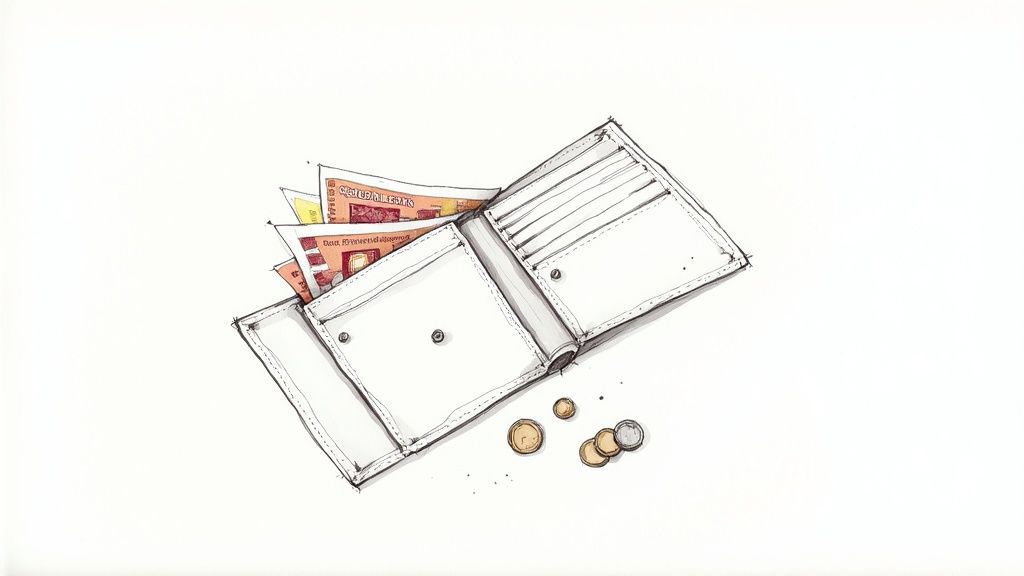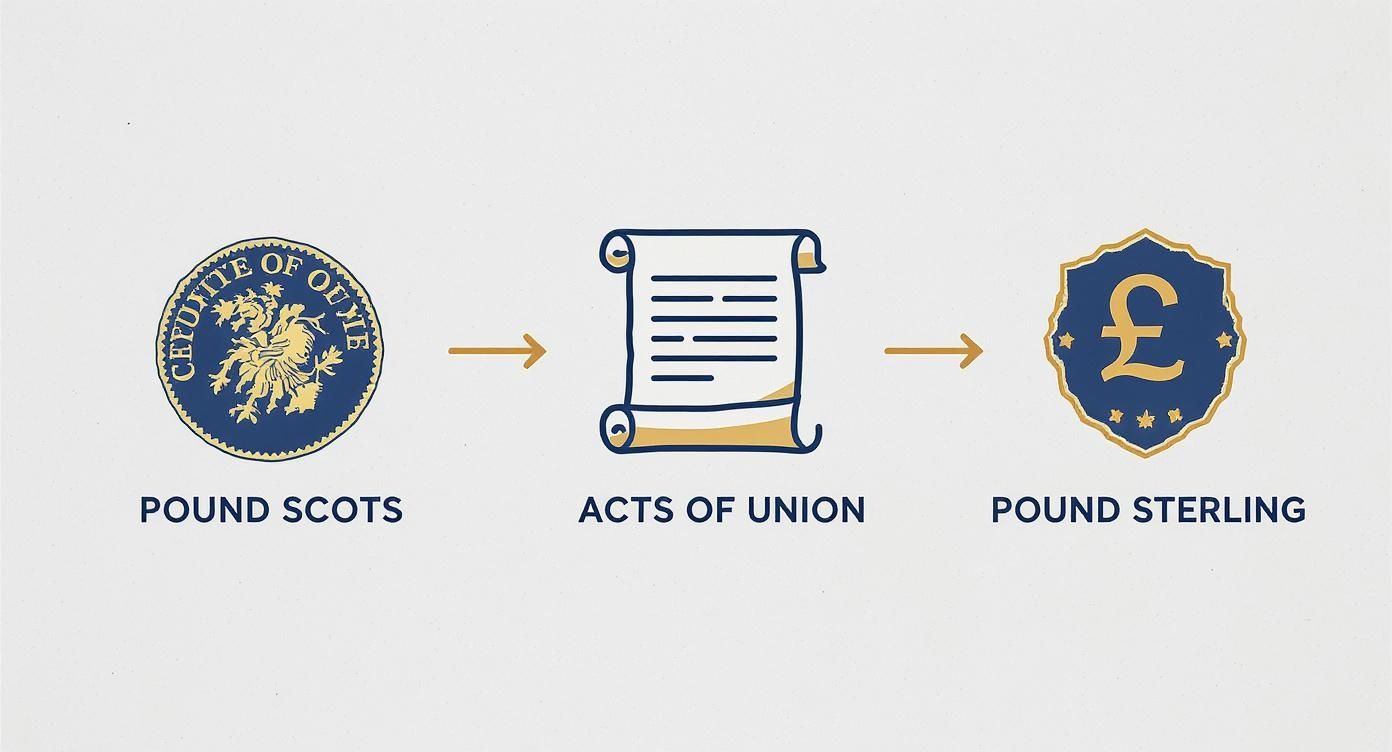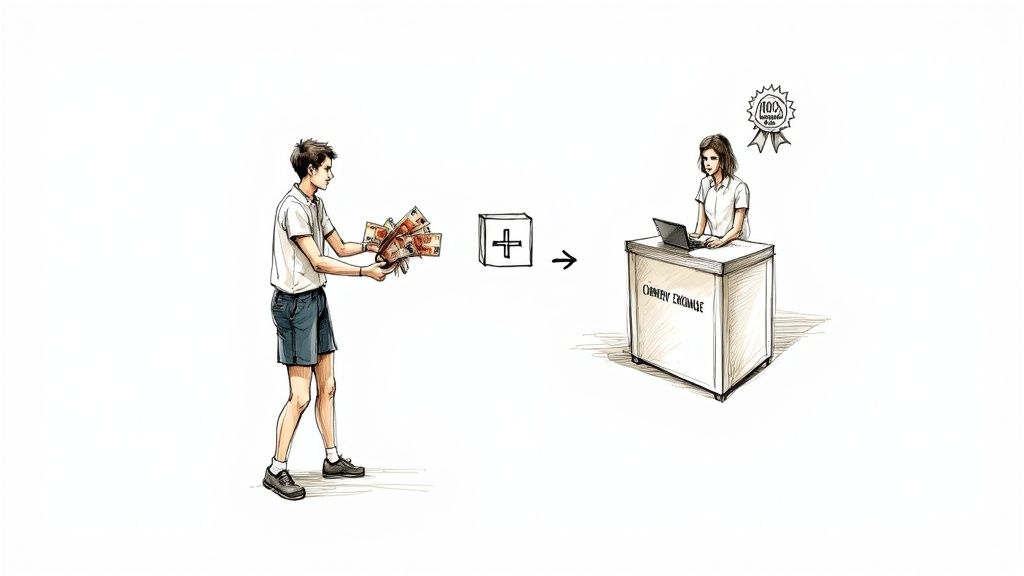What Is the Currency for Scotland? Your Guide

Posted by: Ian Stainton • 17 Nov 2025
If you're planning a trip to Scotland, one of the first things you'll probably wonder about is the money. It’s a common question, and the answer is refreshingly simple: Scotland uses the Pound Sterling (GBP), just like the rest of the United Kingdom. But there's a little twist that often catches visitors by surprise.
So, What's the Deal with Scottish Money?
While the official currency is the Pound Sterling, Scotland has a unique arrangement that allows three of its biggest banks to print their own banknotes. You'll see notes issued by the Bank of Scotland, the Royal Bank of Scotland, and Clydesdale Bank.

These notes are worth exactly the same as the Bank of England notes you'd get from a cash machine in London, but they look completely different. Instead of the Queen, you’ll find designs celebrating famous Scottish figures and stunning local heritage. It’s a lovely touch that adds to the country's unique character.
What About the Coins?
When it comes to coins, things are much more straightforward. All the coins you'll find in your pocket in Scotland are the standard UK coins issued by the Royal Mint. That means the pennies, 5p, 10p, 20p, 50p, £1, and £2 coins are identical to those used in England, Wales, and Northern Ireland. So, no need to worry about having a separate pile of Scottish coins!
To make things super clear, here’s a quick rundown of the key facts.
Scotland Currency Quick Facts
| Attribute | Details |
|---|---|
| Official Currency | Pound Sterling (£, GBP) |
| Coins Used | Standard UK Royal Mint Coins |
| Banknotes | Issued by Bank of Scotland, Royal Bank of Scotland, Clydesdale Bank, and Bank of England |
| Acceptance | Scottish notes are legal currency but not "legal tender" (a technical term); accepted everywhere in Scotland and usually in the rest of the UK, though some retailers may refuse them. |
This table neatly summarises what you need to know before you go.
Got Leftover Scottish Notes After Your Trip?
It's common to come home with a wallet full of these unique Scottish notes and UK coins. Dealing with leftover foreign currency can feel like a chore, but it doesn't have to be.
Our service offers a fast, easy, and hassle-free way to exchange foreign coins and notes. We provide a 100% guaranteed service, so you don't even need to sort your coins. We'll turn that leftover holiday money into cash you can actually use. Trusted by major brands including charities, supermarkets, airports, and police forces, we make the whole process simple and credible.
If you're looking to convert foreign coins and banknotes from various travels, you can explore the full range of exchangeable currencies we accept.
The Story Behind Scotland's Unique Banknotes
To really get your head around what currency Scotland uses today, you have to rewind the clock a bit. The country’s unique banknote situation isn't some modern quirk; it's a legacy that goes back centuries, rooted in a completely separate economic history. Long before the UK existed as we know it, Scotland had its own money.
This system was built around the Pound Scots, a currency first rolled out way back in the 12th century by King David I. For hundreds of years, this was the official cash of the kingdom, totally separate from the Pound Sterling used by its English neighbours. As time went on, the value of the Pound Scots drifted further and further away from its English counterpart.
The Unification of Currencies
Things really changed in 1603 when King James VI of Scotland also became King James I of England. At that point, the exchange rate was officially locked in at 12 Pounds Scots to 1 Pound Sterling. This 12:1 ratio stayed put for over a hundred years.
Then came the Acts of Union in 1707, which formally brought the two kingdoms together. This historic move replaced the Pound Scots with Pound Sterling as the one and only currency for the new Kingdom of Great Britain. You can find out more about this monetary history over at Your Scottish Archives.
But here's the crucial part: the Acts of Union included a special clause allowing Scottish banks to keep their historic right to issue their own banknotes. This is the single reason why, even today, you’ll find notes from the Bank of Scotland, Royal Bank of Scotland, and Clydesdale Bank being used right alongside Bank of England notes. They are all Pound Sterling, but they proudly display the designs and heritage of the banks that print them.
It's a fascinating bit of history, explaining why one part of the UK has such a different look and feel to its cash. It’s basically a piece of living history you can hold in your hand.
Knowing this backstory gives a much richer meaning to the different notes you'll come across. Of course, currency is always evolving, and if you've stumbled upon some much older British money, our guide on pre-decimal coin values might be just what you need.
Navigating Scottish Banknotes in Your Wallet
When you open your wallet in Scotland, you'll find it’s filled with Pound Sterling, but with a colourful local twist. Unlike the rest of the UK, where Bank of England notes are the standard, Scotland has three different banks that issue their own banknotes. You'll frequently handle notes from the Bank of Scotland, the Royal Bank of Scotland, and Clydesdale Bank, each with unique designs celebrating Scottish heritage.
This unique situation is a direct result of Scotland's history. This infographic shows the transition from its own currency, the Pound Scots, to the modern system we use today.

The visual timeline really brings to life the impact of the Acts of Union, which merged the old Pound Scots into the Pound Sterling system.
Legal Tender vs Accepted Currency
Here’s where things can get a little confusing for visitors: the difference between "legal tender" and "accepted currency." In Scotland, Scottish banknotes work just like Bank of England notes—every shop, pub, and hotel will take them without a second thought. They are, for all intents and purposes, the everyday currency.
But the term legal tender has a very specific, narrow definition that mainly applies to settling debts in court. This means Scottish notes aren't technically legal tender in England or Wales. So, while most big retailers across the UK will happily accept them, a small shop owner in London isn't legally obliged to.
This distinction is key: While Scottish notes are 100% legitimate Pound Sterling, their acceptance outside Scotland is up to the retailer's discretion, not a legal requirement.
A Legacy of Independence
After the Acts of Union in 1707, Scotland officially adopted the Pound Sterling. A crucial provision, however, allowed Scottish banks to keep the right to issue their own banknotes. This tradition is carried on today by Scotland’s three largest clearing banks—the Royal Bank of Scotland, the Bank of Scotland, and the Clydesdale Bank. You'll see their notes everywhere north of the border, and while they're widely accepted throughout the UK, they're much less common the further south you go. You can learn more about Scotland's legal tender history on cashmatters.org.
If you get back home with a wallet full of leftover foreign currency, including Scottish notes, our service offers a fast, easy, and hassle-free way to exchange it. We're trusted by major organisations like charities, supermarkets, airports, and police forces, and we make it simple to exchange foreign coins and notes with a 100% guarantee. Don't worry about sorting anything; just send it all to us, and we'll handle the rest.
Practical Tips for Spending Money in Scotland
So, now you know the score with Scotland's unique banknotes. Let's get down to the practical side of things: how do you actually get and spend your Pound Sterling when you arrive? A little bit of planning goes a long way and can save you both money and a headache, letting you focus on enjoying your trip.
One of the simplest ways to get cash is to use a local ATM, which you'll find everywhere in towns and cities. This nearly always gives you a better exchange rate than you'd get at the currency exchange counters at the airport. It's a good idea to check with your bank back home about any foreign transaction fees first, just so there are no nasty surprises on your statement.
Cash Versus Card Payments
Scotland is very card-friendly, particularly in the bigger hubs like Edinburgh and Glasgow. But don't make the mistake of relying on your card alone.
Plenty of smaller businesses, especially once you get out into the Highlands and more rural spots, still run on a cash-only basis. Think of those charming local B&Bs, tiny pubs, or market stalls. A good rule of thumb is to carry a mix of both card and cash so you're covered for any situation.
Beyond just getting your head around Scottish notes, brushing up on general tips on obtaining local currency efficiently can really help you plan your travel money better.
Top Tip: When you use your card, always choose to be charged in the local currency (GBP). If the card machine offers to charge you in your home currency, say no! The exchange rates used for this 'Dynamic Currency Conversion' are almost always a rip-off.
A Note on Coins
Thankfully, there's no confusion when it comes to the coins. All the coins you'll get in your change—from the little 1p piece to the chunky £2 coin—are standard UK Royal Mint issues. They’re exactly the same as the ones used in England, Wales, and Northern Ireland, so you can spend them anywhere in the UK without a second thought.
If you get to the end of your trip with a pocket full of these coins and some leftover Scottish notes, don't just let them gather dust in a drawer. Our service offers a fast, easy, and hassle-free way to exchange foreign coins and notes. With our 100% guarantee and no need to sort coins, you can turn that leftover holiday money back into usable cash. We’re trusted by major brands, from charities and supermarkets to police forces, so you know you're in good hands.
So, What Do You Do with Leftover Scottish Cash?
Your incredible trip to Scotland is over, and you've come home with a wallet full of colourful Scottish banknotes. While these notes were perfectly fine everywhere from Edinburgh to the Isle of Skye, you might be finding it surprisingly difficult to exchange them back home.
It’s a common story. Many local banks and currency exchange offices outside the UK simply won’t accept them, leaving you with holiday money that’s not much use. But don’t let it become a souvenir you can’t spend!
A Simple and Guaranteed Way to Get Your Money Back
This is exactly where we come in. We offer a fast, easy, and completely hassle-free way to turn that leftover foreign currency into cash you can actually use. Think of it as turning post-holiday clutter back into real value.
We specialise in making it incredibly simple to convert foreign coins and banknotes. Better yet, we offer a 100% guarantee on our service. You don't even need to sort through your collection of odd coins and notes—just send it all to us, and we'll handle everything.
Our reputation is built on trust. We're the chosen currency exchange partner for major UK brands, including well-known charities, supermarkets, airports, and even police forces.
Here’s a quick peek at just how straightforward our online portal is.

As you can see, we’ve designed the entire process to be clear and simple from the very first click.
We just don't think you should lose out on the value of your leftover money. Whether it’s Scottish notes, old British coins, or a mix from various trips, we make sure it’s put right back in your pocket.
You can also choose to donate foreign coins to charity through our platform, which is a fantastic and simple way to support a good cause.
For a bit more detail on turning old money into new, have a look at our guide on the easy way to exchange old British coins and notes. And if you're interested in the broader world of finance, understanding your general banking considerations can also be quite helpful.
Common Questions About Scottish Currency
To wrap things up, let’s tackle some of the most common questions people have about money in Scotland. Getting these sorted will help you feel completely at ease with your cash, especially if you’re hopping between Scotland and other parts of the UK.
Can I Use English Banknotes in Scotland?
Yes, absolutely. Bank of England notes are accepted everywhere in Scotland without a second thought. It's all Pound Sterling, so whether a note comes from England, Scotland, or Northern Ireland, it's all good to go.
Are Scottish Notes Legal Tender in England?
Now, this is where it gets a little fuzzy for many people. While Scottish banknotes are 100% legitimate currency backed by the Bank of England, they aren't technically 'legal tender' in England and Wales. In simple terms, this just means a shop isn’t legally obliged to accept them.
Most big high-street chains won't bat an eyelid, but you might find smaller, independent shops are a bit more hesitant.
Our advice is simple: try to swap any Scottish notes for Bank of England notes at a bank before you leave Scotland. This will prevent any potential awkwardness at the till.
What Should I Do if a Shop in England Refuses My Scottish Note?
First off, don't panic. If a shop in England or Wales politely declines your Scottish note, your easiest fix is to pop into any major high-street bank. They will happily exchange them for Bank of England notes for you, free of charge.
If you only discover them after you’re back home, you can use a fast, easy, and hassle-free service like ours to exchange foreign coins and notes.
The History Behind the Currency System
The switch from the old pound Scots to the pound sterling back in 1707 was a huge moment in the nation's financial story. The Acts of Union made it official, replacing the pound Scots with sterling at a fixed 12:1 rate. Of course, the pound sterling has seen plenty of its own changes since then, most notably the shift to a decimal system in 1971. You can dive deeper into the history of the pound Scots on Wikipedia.
Can I Donate My Leftover Scottish Coins and Notes to Charity?
Yes, and it’s a brilliant way to put that spare change to good use. Many charities are more than happy to accept foreign and old currency donations.
Our service proudly partners with lots of UK charities, making it simple for them to turn these collections into vital funds. You can even send your leftover foreign currency directly to us and choose one of our charity partners to receive the proceeds. It’s a fantastic way to turn your travel leftovers into real support for a good cause.
At We Buy All Currency, we turn your leftover holiday money into usable cash. Our process is fast, easy, hassle-free, and 100% guaranteed, with no need to sort coins. Trusted by major brands, including charities, supermarkets, airports, and police forces, we make it simple to convert your currency.
Visit us today to exchange your leftover foreign coins and banknotes at https://www.webuyallcurrency.com.
